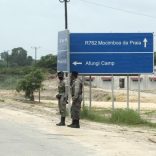Mozambique: Health Ministry confirms shortage of BCG vaccine
Mozambique: New insurgent push into Nampula – By Joseph Hanlon

Image: VOA
In this issue
- Insurgents move south into Nampula again
- Nun killed as mission attacked
- Resource curse behind insurgency say experts
- Ukraine gas and diplomacy implications
Insurgents move south into Nampula again, killing 17 including a nun
Insurgents attacked in two districts of Nampula province, Erati and Memba, in the past two weeks, in the biggest move south from Cabo Delgado. They moved from Ancuabe thorough Chuire districts in Cabo Delgado, south to Erati and Memba in Nampula. They killed at least 17 people, including an Italian teaching nun who had lived in Mozambique for 59 years.
In June insurgents moved south into the previously safe Ancuabe district, then for the first time south of the N1 road (to Pemba) and into Chiure district, and finally over the Lúrio River into Memba district of Nampula, carefully following a route likely to provide support (see https://bit.ly/Moz-602 and https://bit.ly/Moz-599). Fighting continued only in Ancuabe, but a bigger group of 20 insurgents this month (September) followed the same route attacking Memba (the district in the north east of Nampula on the Lúrio River and the coast) and Erati (inland from Memba and south of the Lúrio).
The march south
Ancuabe district
28-29 Aug: Insurgents attacked Nacuale and Mbonge villages, 10 km west of Ancuabe town in Ancuabe district, killing at least four people in their fields. This forced the cancellation of celebrations on 31 August in Ancuabe town to mark the 51st anniversary of its elevation to a “villa”.
29-30 Aug: Insurgents then moved south, crossed the N1 main road and attacked Metor and Megaruma villages on the Megaruma river. Eleven bodies were found.
Chiure district
29 Aug – 1 Sept: Micolene and Muamula, villages about 10km from Chiure towns, were attacked. In Micolene, the insurgents beheaded a man who sold nipa, a local alcoholic spirit. In Muamula they burned houses and cars.
Erati district
2 Sept: Insurgents crossed the Lúrio River to Nampula province and attacked Kutua village, on the southern bank of Lúrio river in Erati district. They burned a dozen houses and government buildings, including the local health post and a school. Government quickly acknowledged the attack. By 6 September 38,000 people had fled their homes in Erati; some were already displaced and had previously fled south from Cabo Delgado. But some people who had fled Kutua had quickly returned, said district administrator Manuel Manussa.
Memba district
4 Sept: Insurgents moved east into Memba district and attacked Naminhanha village, burning homes and taking goods.
6-7 Sept: Insurgents attacked the Comboni mission in Chipene. (details below). Defence forces (FDS) flew in by helicopter and set up a base 8 km from Memba town. The Secretary of State for Nampula, Mety Gondola, challenged the Mozambican Defence and Security Forces (FDS) to step up their vigilance and talk more to local people to track insurgent movements.
11 Sept: Many civil servants fled Memba and have not returned, fearing for the safety of themselves and their families, so some state institutions remain closed.
President Nyusi, speaking in Xai-Xai of 7 September, said that “six citizens were beheaded, 3 kidnapped, six terrorists were captured and dozens of houses torched in the districts of Erati and Memba.” Insurgents are known to have been recruiting in Memba and other zones of coastal Nampula, and the president said that a recruiter had been arrested in coastal Mogincual district with 16 young recruits. He added that Mozambican forces recently recaptured an insurgent base in Ancuabe.
(Savana 9 Sept; Zitamar 1,5 Sept; IOM 6 Sep; AIM 2, 7 Sept; O Pais 7, 12 Sept; Reuters 8 Sept, LUSA 31 Aug, 8 Sept)
Nun killed as Comboni mission attacked
The movement of the insurgents was being tracked by local people and thousands of people fled as they advanced. On Tuesday 6 September, 78 of the students at the Comboni mission school in Chipene, Memba, were sent home for fear of attack.
At 21.00 on Tuesday sister Maria de Coppi saw the insurgents and yelled out to warn others. She was shot in the head and killed – “to shut her up” said Savana (9 Sept). Two other nuns, two priests, and 12 remaining students fled to safety. No one else was killed or injured, but much of the mission was burned.
Sister Maria de Coppi had been in Mozambique for 59 years, since before independence, and was a respected teacher. She was 83 years old and born in Italy.
Comment: Islamic State (IS) social media reports on the war in Mozambique are often accurate and with photos, which suggests some insurgent bands now have someone with a smartphone and training to report quickly. Insurgents also seem to have stopped destroying mobile telephone towers, indicating they are using local networks. There has also been a shift in social media to a stress on attacks on Christians – not always true, but the Comboni mission attack was publicised. Local al Shabaab insurgents have previously stressed their differences with official Islamic groups and not mentioned Christians. Catholic churches were attacked earlier in the war but not recently. Is IS pushing the local insurgents to attack Christians? jh
Resource curse is behind insurgency say three well-informed researchers
“Acknowledging and tackling the root causes of the crisis is essential for long-term peace in Cabo Delgado.” Recruitment to the insurgency was “facilitated by the so-called natural resource curse,” writes Liesl Louw-Vaudran, Senior Researcher at ISS Pretoria. In a survey of people in Pemba and in camps of internally displaced people (IDPs), “45% of respondents said the main root cause of the insurgency was the discovery of rubies and natural gas.” Asked for the three most important issues, jobs, education and poverty came top. Only then came “terrorism/violent extremism”. And religion and ethnicity were hardly mentioned.
“The belief is that most jobs in the new industry would go to foreigners and compatriots from the south of the country, rather than to local Muslim youth, whose hopes of employment and a better future were ultimately dashed. This perceived social exclusion seems to be the most important contributor to the emergence of the insurgency,” writes Liazzat Bonate, one of the most knowledgeable researchers on Islam on the Swahili coast, and now at the Christian Michelsen Institute.
The Institute for Security Studies (ISS) in Pretoria is quite conservative in its thinking, yet its first recommendation to government is “Partner with local organisations to address legitimate grievances.”
These are very different studies. Bonate writes mainly of the long history of international jihadism and notes that jihadist ideology was present in Mozambique even before independence. The ISS stresses the current war, but its report points to the presence of radical Islam from at least 1989. However, both stress the importance of the grievances as facilitating insurgent recruitment. Bonate writes: “marginalisation, maladministration, corruption, police violence, tensions between centre and periphery etc. fertilise the soil for jihadism to flourish.”
Finally, probably reflecting the ideas of funders, the ISS report is subtitled “Drivers and links to transnational organised crime”. But the report rejects its own title, saying “organised crime in Cabo Delgado had existed for several decades before terrorism” and there is no evidence linking the insurgents to organised crime.
Links:
- Liazzat Bonate, “O jihadismo transnacional e a insurgencia em Cabo Delgado, Moçambique,” Afro-Asia, n. 65 (2022): 519-553, (Portuguese only, free) https://periodicos.ufba.br/index.php/afroasia/article/view/46936/26897
- Liesl Louw-Vaudran, “The many roots of Mozambique’s deadly insurgency”, ISS, 8 September 2022, https://issafrica.org/iss-today/the-many-roots-of-mozambiques-deadly-insurgency
- Martin Ewi et al, “Violent extremism in Mozambique: drivers and links to transnational organised crime”, ISS, 5 September 2022, https://issafrica.org/research/southern-africa-report/violent-extremism-in-mozambique-drivers-and-links-to-transnational-organised-crime
The complex mix of Ukraine, Russia, EU, US, gas and climate emergency
The war in Ukraine is having varied impacts on Mozambique. The US is pushing Mozambique to take sides. The EU is backing Mozambican neutrality and providing military support to gain more gas. Globally the agreed target of holding global heating to 1.5º has been effectively abandoned, with 2º more likely; that in turn means possible huge profits from gas and ensured huge damage from the climate emergency.
Taking sides: Although the war is clearly a Russian invasion of Ukraine, both Russia and the US portray this as a war between Russia and NATO led by the US. Most African countries have refused to take sides, which angers the US. But the US proxy war in the 1980s killed 1 million Mozambicans, and Mozambique was saved in part by military support from the Soviet Union (now Russia). On 4 August US ambassador to the United Nations, Linda Thomas-Greenfield, warned African countries that they could buy fertilizer and grain from Russia, but buying anything else including oil, would be breaking sanctions, and action would be taken. (New York Times 5 Aug)
The US is Mozambique’s largest bi-lateral donor, and in a very confusing incident, the US “asked” Mozambique to bar from its ports seven Russian shipping companies and 69 Russian ships which are sanctioned. The Mozambican Ministry of Foreign Affairs and Cooperation sent the request to the Ministry of Transport and Communications which forward it to the customs authorities which issued an order on 18 August to enforce the ban. But the order was then cancelled on 26 August. (LUSA 8 Sep)
EU: The EU’s high representative for foreign affairs Josep Borrell was in Maputo last week (8-9 September), gushing in his support, and accepting Mozambican neutrality. He wants more gas as soon as possible for Europe and wants to pour money into Mozambique to support the war. The EU is providing military training. Borrell handed over $89 mn in “non-lethal” equipment for the 600 soldiers being trained, and announced $20 mn for the Rwandan soldiers and $15 million to support the SADC military mission to Mozambique (SAMIM) – plus $65 mn in development projects.
But in a meeting with President Nyus, Borrell added to the warnings about dealing with grievances. Borrell said: “we know that we cannot win a war against terror only with soldiers and weapons. The solution cannot be only a military solution. In these circumstances, you cannot win the war if you do not win peace.” This means “not only military support, but also boosting economic development. Economic growth, job creation, wellbeing of the people, public services, education, health. These are the basis of peace.”
Climate: The Financial Times (6 Sept) estimates that European governments will spend at least $50bn this winter on new and expanded fossil fuel infrastructure and supplies, including gas shipped in from overseas and coal to fuel previously mothballed power plants. Just the proposed new gas terminals will cost $300 bn. For this new expenditure to be profitable, there will be a demand for long contracts which will lock Europe into fossil fuels just when it was agreeing to sharp cuts to avoid a climate emergency. In fact, whatever the Eurocrats say, clean energy is off the agenda. This creates two problems for Mozambique.
“The big lesson of the oil shocks of the 1970s was that by the mid-1980s there was a global glut. Market forces will surely deliver the same outcome [this] time,” writes Martin Wolf in the Financial Times. (6 September) The World Bank has already warned that under plausible scenarios of falling gas demand and prices, Mozambique will not profit from its gas, and instead will be left with large debts. Any peace deal with Russia will probably end sanctions on Russian gas, increasing the oversupply. Will Mozambique lose out from any gas boom?
And the gas companies had already been talking of global heating of 2º instead of 1.5º. This is enough to cause huge damage in Mozambique from more serious droughts, and worse cyclones and flooding.
Meanwhile Mozambican President Filipe Nyusi warns that climate change is real and has already become an integral part of everyone’s life. “If we want to survive and prevail as human species we have to assume that any initiative, economic and social venture will have to take into account adaptation to climate change. Otherwise our development will never be sustainable”, warned the president. Nyusi was speaking at a SADC meeting in Maputo. (AIM 9 Sep)
He stressed adaptation to heating, rather than prevention. He said nothing about the contribution Mozambican gas will make; he only stressed the need to adapt. But the cost may be higher than any profits from the gas. The rich countries have three times at COP conferences promised to contribute $100 bn per year to the poor countries, but have only paid a small fraction of that. Nature (20 Oct 2021) reported that at 2º the need will be for trillions of dollars per year. Nyusi and future presidents cannot expect much adaptation help from the rich countries. And the Ukraine-driven fossil fuel boom will probably not profit Mozambique either.
Other news
Inflation hit 12.1% in August, as measured by the Consumer Price Index, year to year. This is highest in five years, and is due to fuel and food prices. Standard Bank predicts this is the high for the year and inflation will fall slightly.
By Joseph Hanlon












Leave a Reply
Be the First to Comment!
You must be logged in to post a comment.
You must be logged in to post a comment.